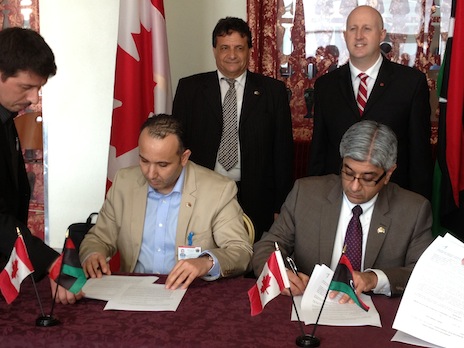By Michel Cousins.

Tripoli, 21 March 2013:
The Ministry of Heath today, Thursday, signed MOUs with two Canadian healthcare organisations that are in . . .[restrict]Tripoli as part of a five-member healthcare delegation.
The two organisations are the University Health Network (UHN) and the Royal College of Physicians and Surgeons of Canada.
The MOU signed by Dr Nizar Mahomed of Toronto Western Hospital, part of the UHN, and Managing Director of Altum Health, covers training for Libyan doctors, nurses and paramedics as well setting up research facilities, healthcare provisions and the establishment of a cancer centre.
The agreement signed with the Royal College aims at building an education and innovation centre in Tripoli and, later, four of five similar facilities elsewhere in Libya. Effectively they will be medical colleges. “These will be state-of-the-art, technologically advanced centres,” said Dr Karim Qayumi who signed for the Royal College. “They will bring Libyan medical students to international levels.” The centres will connect with academics in Canada by online and tele-teaching. They will also award qualifications.
The signing of an MOU with a company or organisation that has just arrived is unusal and these two agreements are seen as evidence of the Ministry of Health’s desire to move forward quickly in building a quality health service that meets Libyan demands and expectations. “The timing (of the visit) was good,” said Canadian Ambassador Michael Grant, referring to the fact that the budget has just been passed and government ministries now feel that they can now act rather than canvass ideas.
One of the reasons why Libya felt very comfortable collaborating with Canadian healthcare organisations in reforming its health service, he said, was because of the foundations laid during and after the revolution. Libyan doctors in Canada – there are around 500 – returned to treat the wounded and afterwards, through the Libyan-Canadian Medical Association, drove the scheme whereby Libyan war-wounded were taken to Canada for treatment. “There were not the numbers that went elsewhere”, says Ambassador Grant, “but it was very successful. There were zero issues.”
There were numerous problems surrounding the treatment of Libyans in a number of countries closer to home last year. There were allegations of massive over charging, corruption on both sides and large numbers of ordinary Libyans pretending they were war wounded in order to get treatment unavailable in Libya or simply take a vacation at the state’s expense. Arguments about hundreds of millions of dollars-worth of bills continue to bedevil relations with Jordan and other states.
According to Hume Martin, a member of the UHN delegation, it did not happen in Canada’s case partly because number of patients taken was small – just 55 in UHN’s case – but also because they were carefully selected. Patients were chosen on the basis that their needs, and their expectations, could be met, he said.
Since then the Libyan-Canadian Medical Association has acted as a midwife to developing heathcare cooperation between the countries. Today’s MOUs are seen as partly the result of that work.
[/restrict]









